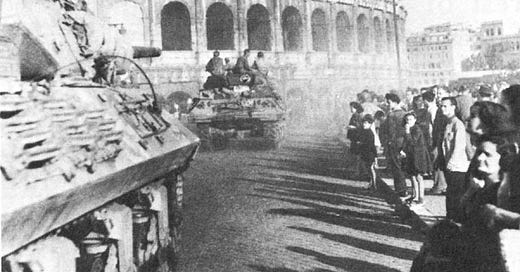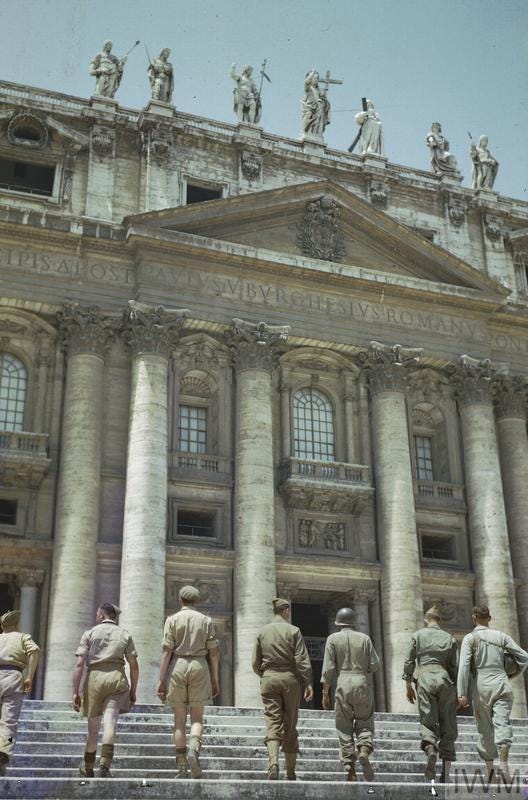Liberating the Eternal City
From the jeep that carried him up the Via Casilina on June 4, 1944, Seymour Korman of the Chicago Tribune marveled at the distant sight of the dome of St. Peter’s Basilica, “golden in the calm Italian sunshine.”
Our reception by the citizens of Rome is yet to come. It is unlikely that it will be the riotous welcome accorded to us at Naples, for the Roman is not by nature as emotional as the Neapolitan.
But however that may be, to the allied soldiers coming into Rome tonight and to those who will come tomorrow this is history. Never before has Rome been conquered from the south. Never before have the warriors who came to the gates traveled so long a road — from El Alamein, from Casablanca and Oran, across the African desert and plain, across Mediterranean and Tyrrhenian water and up the incredible, rugged peaks of the boot of Italy.
While the triumph would be short-lived in the global consciousness thanks to the landings in Normandy that upstaged it some 36 hours later, the troops who had endured months of brutal fighting in Italy and beyond, and the correspondents who had accompanied them, reveled in the moment.
“Rome, the eternal city, was liberated tonight,” wrote Daniel De Luce of the Associated Press.
De Luce typed out his story under cover behind a roadside embankment, “about a block from the blue and white city limits sign that reads ‘Roma.’” He and other correspondents moving in with the troops described sporadic resistance from German troops pulling out to the north.
As the Fifth Army advanced through the outskirts of the city, Italians came out to greet the liberators despite artillery and sniper fire. Multiple correspondents mentioned a wedding party emerging from a church and proceeding down the road, oblivious to the danger.
“The bride was a pretty blonde, the bridegroom had dark, curly hair, and they came from their vows in a little church with no thoughts of war in their glances,” Korman wrote.
Added Omar Garrison of Reuters:
“Bullets and shrapnel were still flying. We held our breath, amazed. Yet the procession never faltered. When it drew abreast of our column the bridegroom paused and, raising his arm, shouted: ‘Viva l’Americani.’”
The Allies’ move into Rome was especially sweet for those who had called the city home before war intervened, most notably United Press correspondents Reynolds and Eleanor Packard.
Reynolds had been the UP’s Rome bureau chief before the couple were interned along with other American correspondents days after the Pearl Harbor attack brought the U.S. into the war.
The Packards and others from the group were repatriated in May 1942 as part of an exchange, sailing from Lisbon to New York, but returned to the fray as soon as they could. Reynolds landed in Italy with Allied troops in September 1943 and Eleanor joined him six months later after a stint as the UP’s bureau chief in Turkey.
As Gen. Mark Clark’s troops headed back into Rome on June 4, the irrepressible husband-and-wife duo led the way for the press corps, their jeep fourth in line behind three American tanks. Once inside the city, they headed straight to the bar at the Grand Hotel for some Italian cognac.
The Italians at the bar at first thought we were Germans and would not drink with us, but when Peter, the barman, and the manager of the hotel recognized us the atmosphere changed abruptly.
Five minutes later the American stars and stripes and the British union jack were flying from the hotel’s flagstaffs over the doorway — the first Allied flags to fly in Rome since the United States entered the war.
Riding through the streets, the Packards were swarmed by well-wishers who threw roses into their jeep and inevitably showered both with kisses. It took time for some locals to figure out that Eleanor wasn’t a man, considering she was wearing pants — a practical habit that would make history days later at the Vatican.
The flood of kisses from Italian men didn’t sit well with their driver, Pvt. Delmar Richardson of Fort Wayne, who grumbled, “We don’t welcome people like that in Indiana.”
This, however, was Italy.
Once the tank in front of us stopped and the officer in charge came back and asked if we had a map of Rome as he was supposed to go to the railway station and was not sure of the route.
When the Italians surmised what was wanted, there was a torrent of excited and contradictory advice. A score offered to hop on the tank and direct the crew, while others made such a din that it was nearly impossible to concentrate on map reading.
Another correspondent on the scene, Herbert Matthews of the New York Times, was interned and later repatriated with the Packards. His initial dispatches from the liberated city weren’t quite as personal — no surprise, given his employer — but were no less affectionate.
He wrote with relief of how little damage the historic center of the city had sustained in the intervening years, and that the populace, while left hungry by German austerity measures, was not starving. His dispatch filed June 5, which appeared in the next day’s Times, closed with a three-paragraph tour.
No one could drive through this ancient city today and not sense its greatness. Here were the Spanish Steps and lovely flowers to buy at the bottom, as always. Bridges were intact, for contrary to expectations the Germans did not blow them up, or any hotel or building either, and so far as was known this afternoon, no mines have been left.
You cross the Tiber, most famous of all rivers of the western world, which our troops crossed during the night in pursuit of Germans, and soon you come on the massive Castel Santangelo that was once the Roman mausoleum. Then the majestic dome of St. Peter’s rises to view beyond an ugly wide avenue with modern houses the Fascisti built. And with the Vatican you know nothing has changed or ever can change in Rome even though a Piper Cub observation plane flies overhead.
We drove our jeep back from there to a well-known restaurant, San Carolo, where Umberto Storci, its proprietor, fell on our necks for joy. He had been serving German soldiers until 5 o’clock yesterday afternoon. Now he will serve us but with a different heart.





